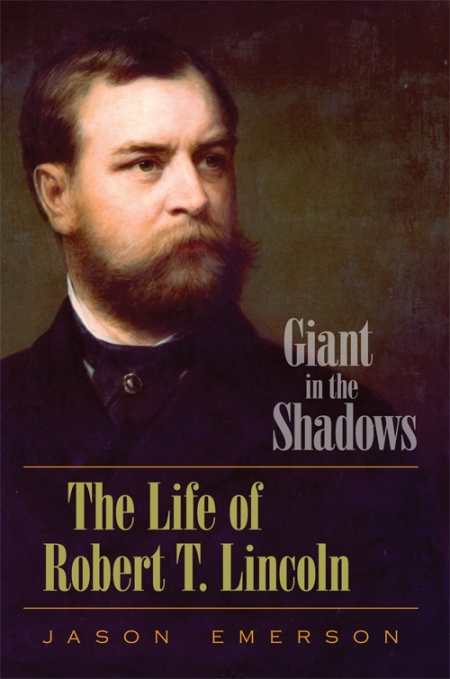Giant in the Shadows
The Life of Robert T. Lincoln
Life for the son of the nation’s most beloved and likely greatest president was full of challenges, yet Robert Todd Lincoln (1843-1926) embraced his circumstances and thrived in business, public service, and family life. Certainly, the Lincoln name brought a pedigree and advantages that propelled the younger Lincoln to financial success, but it also came with a price: the death of three siblings during their childhoods, the assassination of his father, legally declaring his mother insane, and the death of his own son. All these events cast dark shadows on Robert Lincoln.
The author, an independent historian and journalist, blends his professions skillfully to write the authoritative biography of Lincoln. This lucid, deeply researched account is more than twenty-five percent notes and bibliographic citations. Emerson has served as a park ranger at the Lincoln Home National Historic Site in Springfield, Illinois. He is also the author of The Madness of Mary Lincoln and Lincoln the Inventor.
Included in this title are many captivating stories about Robert Lincoln’s life, from his Springfield childhood through his hail-fellow, well-met days at Harvard to his brief service in the Civil War as a member of General Grant’s staff to appointments as Secretary of War by President James Garfield and as Minister to Great Britain by President Benjamin Harrison, and, finally, to his lucrative and controversial presidency of the Pullman Company. One such anecdote tells how the young Harvard student was saved from being crushed by a train by the famous actor Edwin Booth, whose brother would assassinate President Lincoln.
Lincoln was most zealous of being the guardian of his father’s legacy and reluctant to open Abraham Lincoln’s papers to other writers. Toward the end of his life, however, Robert relented and donated the president’s papers to the Library of Congress in 1923. Although shy about making public appearances, Lincoln acknowledged that one of his greatest experiences was speaking at the dedication of the Lincoln Memorial on May 30, 1922.
Emerson does gloss over Robert Lincoln’s controversial role in the unfair treatment of the Pullman Company’s black porters by claiming the problems were caused by Pullman officials with delegated authority. However, Emerson has written an important work about Robert Lincoln and life in the Gilded Age that will engross informed Lincoln enthusiasts and be welcomed by scholars.
Reviewed by
Karl Helicher
Disclosure: This article is not an endorsement, but a review. The publisher of this book provided free copies of the book and paid a small fee to have their book reviewed by a professional reviewer. Foreword Reviews and Clarion Reviews make no guarantee that the publisher will receive a positive review. Foreword Magazine, Inc. is disclosing this in accordance with the Federal Trade Commission’s 16 CFR, Part 255.

